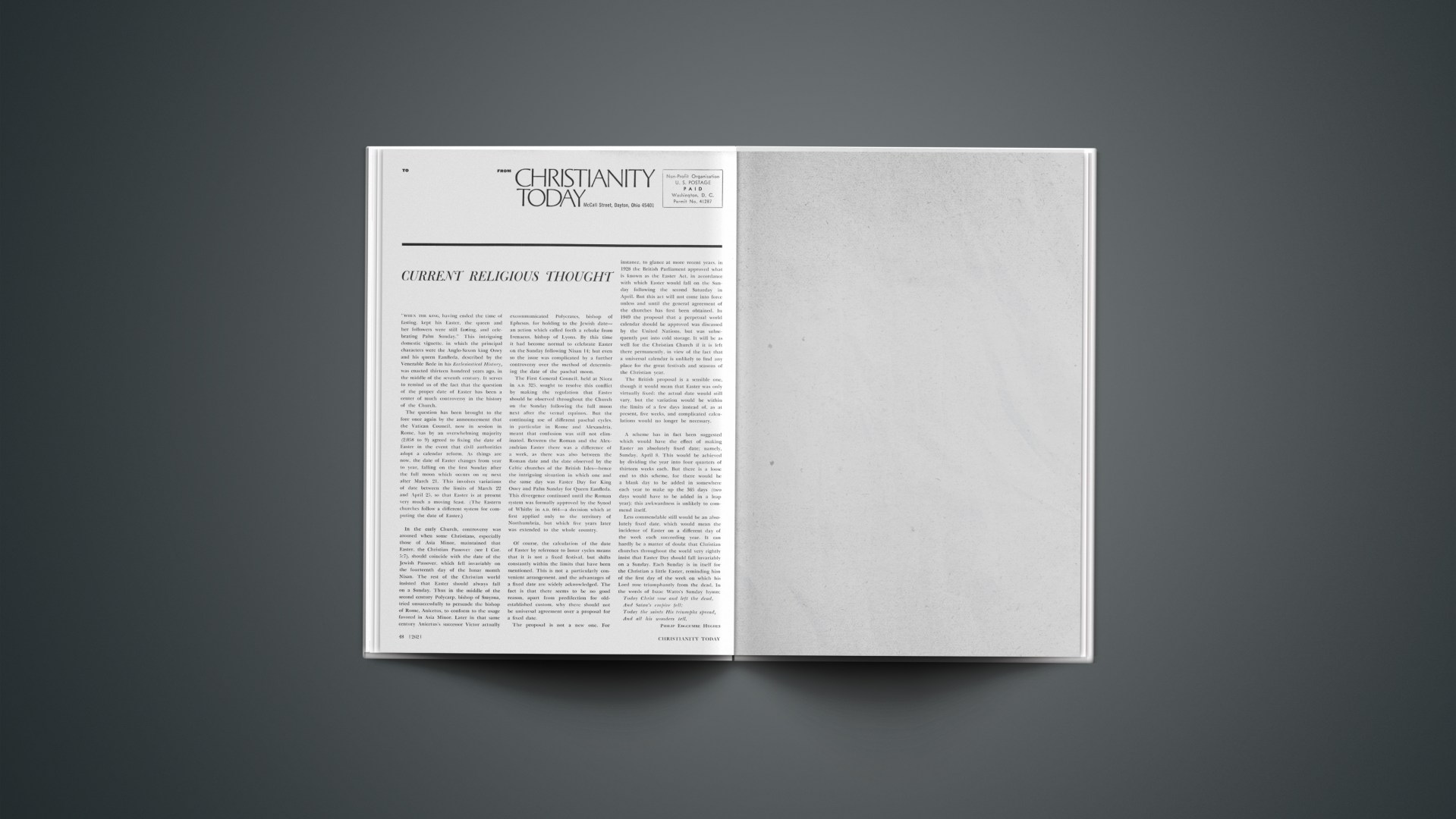“When the king, having ended the time of fasting, kept his Easter, the queen and her followers were still fasting, and celebrating Palm Sunday.” This intriguing domestic vignette, in which the principal characters were the Anglo-Saxon king Oswy and his queen Eanfleda, described by the Venerable Bede in his Ecclesiastical History, was enacted thirteen hundred years ago, in the middle of the seventh century. It serves to remind us of the fact that the question of the proper date of Easter has been a center of much controversy in the history of the Church.
The question has been brought to the fore once again by the announcement that the Vatican Council, now in session in Rome, has by an overwhelming majority (2,058 to 9) agreed to fixing the date of Easter in the event that civil authorities adopt a calendar reform. As things are now, the date of Easter changes from year to year, falling on the first Sunday after the full moon which occurs on or next after March 21. This involves variations of date between the limits of March 22 and April 25, so that Easter is at present very much a moving feast. (The Eastern churches follow a different system for computing the date of Easter.)
In the early Church, controversy was aroused when some Christians, especially those of Asia Minor, maintained that Easter, the Christian Passover (see 1 Cor. 5:7), should coincide with the date of the Jewish Passover, which fell invariably on the fourteenth day of the lunar month Nisan. The rest of the Christian world insisted that Easter should always fall on a Sunday. Thus in the middle of the second century Polycarp, bishop of Smyrna, tried unsuccessfully to persuade the bishop of Rome, Anicetus, to conform to the usage favored in Asia Minor. Later in that same century Anicetus’s successor Victor actually excommunicated Polycrates, bishop of Ephesus, for holding to the Jewish date—an action which called forth a rebuke from Irenaeus, bishop of Lyons. By this time it had become normal to celebrate Easter on the Sunday following Nisan 14; but even so the issue was complicated by a further controversy over the method of determining the date of the paschal moon.
The First General Council, held at Nicea in A.D. 325, sought to resolve this conflict by making the regulation that Easter should be observed throughout the Church on the Sunday following the full moon next after the vernal equinox. But the continuing use of different paschal cycles, in particular in Rome and Alexandria, meant that confusion was still not eliminated. Between the Roman and the Alexandrian Easter there was a difference of a week, as there was also between the Roman date and the date observed by the Celtic churches of the British Isles—hence the intriguing situation in which one and the same day was Easter Day for King Oswy and Palm Sunday for Queen Eanfleda. This divergence continued until the Roman system was formally approved by the Synod of Whitby in A.D. 664—a decision which at first applied only to the territory of Northumbria, but which five years later was extended to the whole country.
Of course, the calculation of the date of Easter by reference to lunar cycles means that it is not a fixed festival, but shifts constantly within the limits that have been mentioned. This is not a particularly convenient arrangement, and the advantages of a fixed date are widely acknowledged. The fact is that there seems to be no good reason, apart from predilection for old-established custom, why there should not be universal agreement over a proposal for a fixed date.
The proposal is not a new one. For instance, to glance at more recent years, in 1928 the British Parliament approved what is known as the Easter Act, in accordance with which Easter would fall on the Sunday following the second Saturday in April. But this act will not come into force unless and until the general agreement of the churches has first been obtained. In 1949 the proposal that a perpetual world calendar should be approved was discussed by the United Nations, but was subsequently put into cold storage. It will be as well for the Christian Church if it is left there permanently, in view of the fact that a universal calendar is unlikely to find anyplace for the great festivals and seasons of the Christian year.
The British proposal is a sensible one, though it would mean that Easter was only virtually fixed: the actual date would still vary, but the variation would be within the limits of a few days instead of, as at present, five weeks, and complicated calculations would no longer be necessary.
A scheme has in fact been suggested which would have the effect of making Easter an absolutely fixed date; namely, Sunday, April 8. This would be achieved by dividing the year into four quarters of thirteen weeks each. But there is a loose end to this scheme, for there would be a blank day to be added in somewhere each year to make up the 365 days (two days would have to be added in a leap year); this awkwardness is unlikely to commend itself.
Less commendable still would be an absolutely fixed date, which would mean the incidence of Easter on a different day of the week each succeeding year. It can hardly be a matter of doubt that Christian churches throughout the world very rightly insist that Easter Day should fall invariably on a Sunday. Each Sunday is in itself for the Christian a little Easter, reminding him of the first day of the week on which his Lord rose triumphantly from the dead. In the words of Isaac Watts’s Sunday hymn:
Today Christ rose and left the dead,
And Satan’s empire fell;
Today the saints His triumphs spread,
And all his wonders tell.










